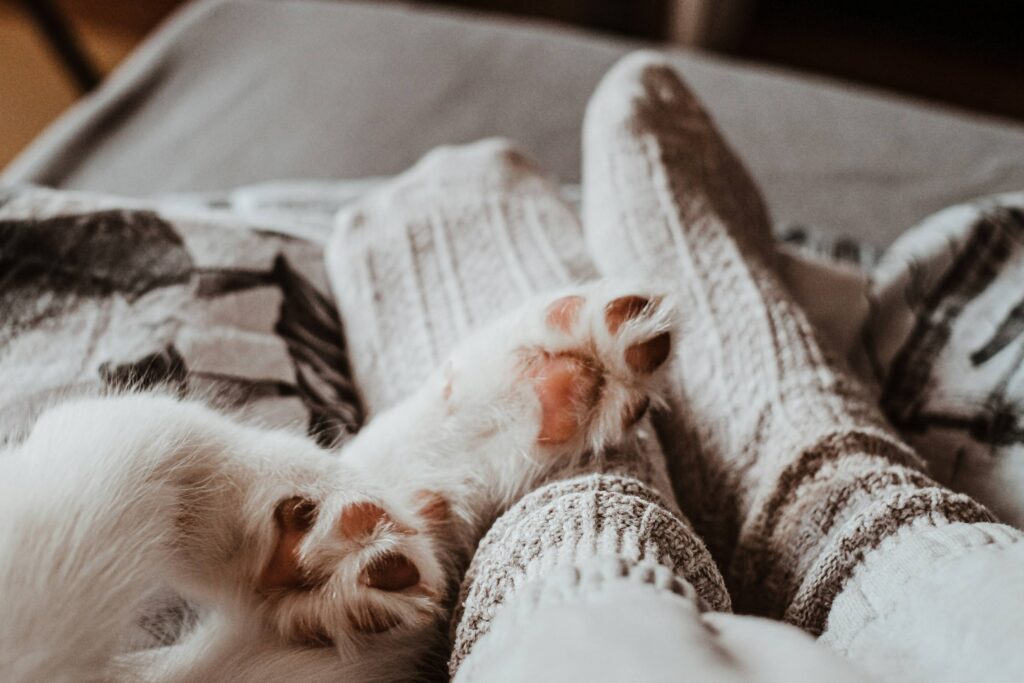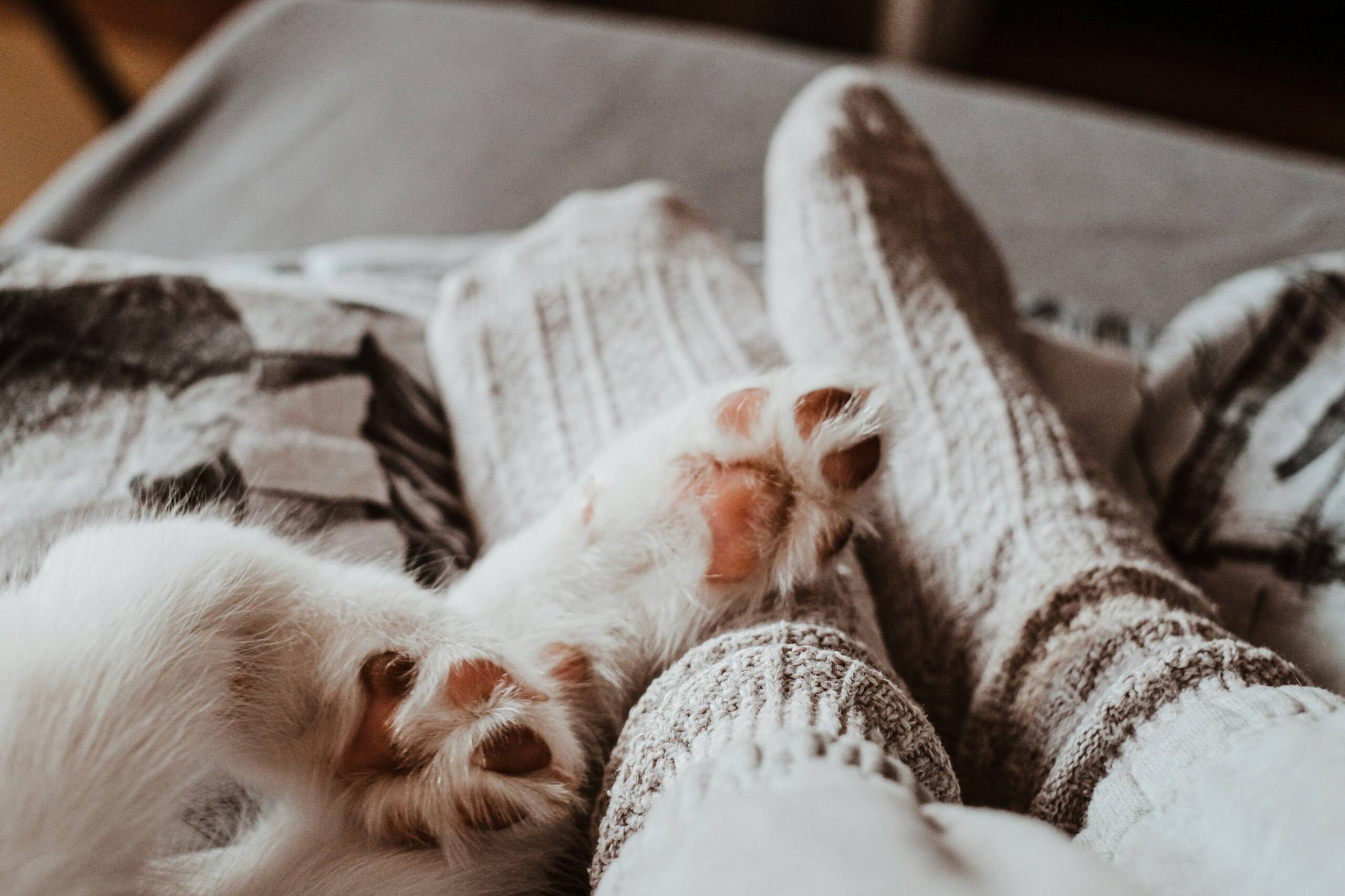Cats Sleep at Your Feet pick to twist up at your feet for a diffusion of reasons, often a combination of:
- Warmth: Your toes, in particular while protected with the aid of blankets, emit heat, growing a cozy and comfy spot for your cat to snooze.
- Security: Cats experience prone while slumbering, and being close to you offers them a sense of safety and safety. They trust you to keep them safe from capability threats.
- Comfort: Your scent is familiar and comforting for your cat, making your bed, and by using extension, your feet, a relaxing area to relaxation.
- Strategic location: The foot of the bed can offer an smooth escape course if your cat feels startled unsleeping. It may additionally offer a very good vantage factor to keep an eye on the room.
- Companionship: Cats are social creatures, and drowsing near you is a way for them to expose affection and bond with you.
Discover the motives behind why cats showcase this conduct
Eeper Dive into why does my cat sleep at my feet:
While we recognize the overall reasons cats select to sleep at your toes (warmth, security, consolation, and so forth.), delving deeper exhibits some charming aspects of feline conduct and psychology:
1. Thermoregulation: Cats are adept at conserving power, and your body heat affords a easily to be had supply of heat. Their paws are specifically sensitive to temperature, making your included ft an impossible to resist heat source, in particular in less warm climates.
2. Social Bonding: Though regularly perceived as unbiased, cats shape robust social bonds with their human partners. Sleeping close to you strengthens this bond and allows them to sense related, in particular at some point of inclined sleep durations.
3. Communication and Scent Marking: Cats communicate thru various method, which includes scent marking. By snoozing near you, they is probably subtly leaving their scent on you, further solidifying the bond and claiming you as their very own.
4. Ancestral Instincts: Though domesticated, cats keep a few ancestral instincts. In the wild, they may curl up with different cats for heat and protection. Sleeping close to you fulfills a similar cause, offering a sense of protection in a susceptible state.
5. Personality and Individual Preferences: Each cat is unique, and their sleep preferences mirror their persona. Some cats may crave regular bodily contact, while others are searching for a stability among closeness and personal area. Additionally, elements like age, health, and surroundings can have an effect on their sleep region.
Further Exploration:
Understanding tom cat behavior is an ongoing journey. Researchers are continuously exploring the fascinating world of cat communication and decision-making.
Cats seeking warmth and luxury from their owner’s frame heat
A Multifaceted Approach
Cats are evidently interested in warm and comfortable environments, and your body warmness gives an impossible to resist supply of consolation for numerous motives:
1. Physiological Need: Cats Sleep at Your Feet, unlike humans, can not successfully adjust their frame temperature. Their average body temperature is around 102°F (38.Nine°C), that’s better than ours (ninety eight.6°F or 37°C). As a result, they actively are seeking for outside heat sources, in particular in less warm climates. Your body warmness affords a without problems to be had and reliable supply of heat, helping their thermoregulation and retaining them at ease.
2. Evolutionary Advantage: Descendants of desolate tract-dwelling ancestors, cats are predisposed to are looking for warm temperature for survival. Their ancestors depended on external warmness sources to maintain body temperature in harsh environments. While domesticated cats are not exposed to the equal extremes, this instinctual drive persists, leading them to gravitate in the direction of warm items, such as you.
3. Comfort and Security: In addition to the bodily advantage of heat, your presence offers a feel of security and luxury in your cat. The familiarity of your fragrance and the rhythmic upward thrust and fall of your breath throughout sleep may be calming and reassuring, creating a secure haven for them to loosen up.
4. Bonding and Social Behavior: Despite their unbiased recognition, cats are social creatures and form strong bonds with their relied on people. Curling up near you permits them to feel linked, give a boost to their bond, and express affection. Your body heat will become an additional layer of comfort and reinforces the feeling of protection and companionship.
5. Individual Preferences: While the above motives are common, it is essential to take into account that person cats have particular personalities and choices. Some cats may crave consistent physical touch and are seeking for your warmth greater frequently, even as others might be more unbiased and prefer different resources of heat.
Security and Bonding
Security:
- Providing a secure haven: When Cats Sleep at Your Feet pick to sleep at your toes, it may be visible as a way to seek safety to your presence. They accept as true with you to act as a protector and feel susceptible whilst sleeping. Being close to you gives a feel of safety and reduces their anxiety.
- Comfort from familiar fragrance: Your heady scent serves as a acquainted and comforting cue in your cat. Sleeping near you permits them to surround themselves with this calming scent, in addition improving their sense of protection.
- Bonding:
- Strengthening the relationship: Sleeping near you is a form of social interaction for cats. It allows them to experience connected and toughen the bond they proportion with you. This close proximity fosters a feel of companionship and agree with.
- Communicating affection: Choosing to be physically close to you can be interpreted as a signal of love out of your cat. They experience secure sufficient to snuggle near you and express their love and trust.
The Intertwined Nature:
- Security results in bonding: Feeling at ease on your presence permits your cat to loosen up and be greater receptive to bonding. They are more likely to showcase affectionate conduct and seek closer bodily contact after they sense safe and guarded.
- Bonding enhances safety: The more potent the bond among you and your cat, the extra comfortable they will sense for your presence. This creates a effective cycle in which agree with and affection support each other, main to a deeper connection.

Territorial Behavior
Marking Their Domain
Cats are acknowledged for their unbiased nature, but in addition they showcase a robust instinct for territoriality. This approach they experience a need to establish and hold manage over a specific location. which they don’t forget their “territory.” This behavior stems from several factors, inclusive of:
1. Survival Instincts: In the wild, securing a territory is crucial for cats. It guarantees get admission to to essential sources like food, water, and safe mating grounds. This deeply ingrained instinct persists in domestic cats, despite the fact that they generally have their primary desires met by their human partners.
2. Communication and Marking: Cats Sleep at Your Feet use diverse way to speak with other cats, together with scent marking. This involves leaving their fragrance on objects and surfaces within their territory thru urine spraying, rubbing, and scratching. This manner, they signal to other cats that the area is alleged and probably discourage them from entering.
3. Security and Control: Maintaining a territory presents cats with a sense of safety and control over their environment. This can be especially critical in multi-cat households, where opposition for sources and area exists. Having a designated location can reduce stress and anxiety in cats.
4. Individual Differences: The diploma to which cats show off territorial conduct varies significantly. Some cats might be fiercely shielding in their whole home, whilst others may most effective declare precise regions like their favored dozing spot. Factors like breed, persona, and beyond studies can also impact territoriality.
5. Managing Territorial Behavior: While information the reasons in the back of territorial conduct is critical, it’s essential to cope with any immoderate or problematic expressions. This may involve:
- Providing enough resources: Ensure your cat has get right of entry to to more than one litter boxes, scratching posts, and feeding stations all through the house to decrease opposition and tension.
- Creating vertical area: Cats feel comfortable when they have perches and excessive vantage factors. Providing cat timber, cabinets, and other mountaineering systems can alleviate territorial stress.
- Positive reinforcement: Reward your cat for calm and positive interactions with different pets or in contested areas. This can assist shift their recognition far from feeling threatened and inspire non violent coexistence.
Social Hierarchy
Social Hierarchy in Cats:
Unlike social animals like dogs or wolves with well-defined dominance hierarchies, cats typically don’t show off a inflexible pecking order. However, a few shape of social structure does exist, specifically in feral cat colonies.
Here’s what we recognize approximately social hierarchy in cats:
1. Loose Hierarchy: In feral colonies, a unfastened matriarchy frequently emerges. Older, skilled ladies, occasionally known as alpha women, can also have priority get entry to to resources like food and favored snoozing spots due to their length, experience, and self assurance. This doesn’t necessarily imply they exert dominance via aggression however as a substitute receive respect from different cats.
2. Fluidity and Negotiation: This hierarchy isn’t always static and may be pretty fluid. Younger cats can challenge the status quo, and alliances can shift primarily based on person personalities and situations. Negotiations, through presentations like body language, vocalizations, and fragrance marking, can decide get right of entry to to assets and clear up conflicts.
3. Individual Preferences: Not all cats in a colony take part actively within the social hierarchy. Some is probably extra solitary and like to keep away from interactions altogether. Additionally, home cats living in single-household environments generally do not showcase hierarchical behavior until delivered to every other cat.
4. Factors Influencing Hierarchy: Several factors can have an impact on the dynamics inside a cat colony, consisting of:
- Age and length: Older, large cats may have a mild advantage in accessing assets.
- Personality: Bold and confident cats can be much more likely to assert themselves.
- Resource availability: The abundance of sources can reduce opposition and decrease the need for a strict hierarchy.
5. Importance of Understanding: While no longer as rigid as in other species, know-how these social dynamics may be useful while:
- Introducing a new cat into your household: Careful advent and creating a superb surroundings can help decrease battle.
- Recognizing capacity strain: If your cat reveals uncommon behaviors, it is probably because of stress related to social interactions in multi-cat environments.
Mimicking Prey Behavior
Hunting Strategy why does my cat sleep at my feet:
While uncommon, some cats exhibit a fascinating behavior: mimicking the sounds or behaviors of their prey. This approach, mainly found after they stumble upon birds or rodents, pursuits to lull the prey into a false sense of safety, making them less difficult to seize.
Here’s a deeper investigate this interesting conduct:
1. The “Chatter”: This precise vocalization, regularly described as a fast chirping or trilling sound, is maximum typically associated with cats fixated on birds outside a window. Theories propose it’d:
- Mimic chook calls: The sounds may resemble the chirps or calls of the goal bird, probably tricking it into wondering every other bird is close by and creating an possibility for an ambush.
- Express pleasure: The chatter may want to virtually be an involuntary vocal expression of the cat’s heightened hunting focus and excitement.
- Body Movements: In a few instances, cats may mimic the moves of their prey.
This ought to contain Cats Sleep at Your Feet:
- Body sways: Mimicking the swaying motions of a chicken on a branch may seem innocent to the chook, reducing its guard.
- Fake pounces: Quick, jerky movements such as the pouncing movement of a predator may momentarily distract the prey, permitting the cat to close the space.
- The Science Behind It: While the precise mechanism isn’t fully understood, several factors probable make contributions:
- Instinct: This behavior is probably a deeply ingrained hunting intuition surpassed down thru generations.
- Observational studying: Kittens would possibly research this strategy by looking at their mothers effectively using it.
- Trial and mistakes: Through trial and errors, individual cats might discover that mimicking prey behavior ends in extra successful hunting tries.
- Not All Cats Do It: It’s important to understand that not all cats exhibit this conduct. Some cats may rely completely on stalking and ambush tactics, while others might hotel to vocalizations or mimicry most effective in precise conditions.
- Understanding Your Cat: Observing your cat’s behavior can offer precious insights into their individual searching strategies and alternatives. Remember, mimicking prey conduct is just one method in their hunting arsenal, and it’s now not a necessary or encouraged conduct in home cats with readily to be had meals.
Health & Physical Comfort – why does my cat sleep at my feet
Sure, right here are some important elements of keeping your cat healthful and bodily cozy:
1. Provide a nutritious weight loss plan: Cats are obligate carnivores, that means their diet ought to primarily encompass animal protein. Choose incredible cat meals this is suitable for your cat’s age, pastime level, and fitness status. Consult your veterinarian for steering on selecting the pleasant food on your cat.
2. Ensure ok hydration: Fresh, easy water is important to your cat’s fitness. Encourage your cat to drink by means of presenting multiple water bowls throughout the house and retaining them easy. Consider the use of a pet fountain to trap your cat to drink extra.
3. Maintain a smooth litter field: Cats are obviously easy animals and prefer a clean clutter container. Scoop the litter field day by day and absolutely change the clutter as a minimum once a week. The litter container must be placed in a quiet, without problems accessible vicinity.
4. Regular veterinary care: Schedule normal checkups along with your veterinarian, even if your cat appears healthful. These checkups can help discover and address capacity health issues early on.
5. Provide opportunities for workout and play: Cats are naturally playful creatures and need opportunities to exercise both their bodies and minds. Engage your cat in regular play periods the usage of interactive toys like feather wands, laser pointers, or puzzle feeders.
6. Scratching submit: Provide your cat with a scratching publish to assist them satisfy their natural scratching intuition. This will help prevent them from scratching furnishings or different family gadgets.
7. Safe and comfy surroundings: Provide your cat with a secure and comfy region to loosen up and sense secure. This could be a cat tree, a relaxed mattress, or a perch near a window.
8. Regular grooming: Brush your cat’s fur often to get rid of unfastened hair and prevent hairballs. This is especially crucial for longhaired cats.
9. Dental care: Regular dental care is critical for your cat’s standard fitness. Brush your cat’s teeth often with a pet-accepted toothpaste, or offer dental treats to help hold their tooth clean.
10. Parasite prevention: Use parasite prevention medicine to defend your cat from fleas, ticks, and worms. Your veterinarian can advocate an appropriate products for your cat.
Conclusion
Wrapping Up the Exploration of Cats Sleeping at Your Feet
Throughout this discussion, we have explored various motives why cats choose to curl up at your toes, revealing a charming interplay of instinct, consolation, protection, and bonding.
Key Takeaways why does my cat sleep at my feet:
- Warmth: Your frame warmness affords a with no trouble to be had supply of comfort and heat, mainly attractive to cats in chillier climates.
- Security: Cats sense prone while dozing, and being close to you gives them a experience of safety and protection. Your heady scent similarly reinforces this sense of protection.
- Comfort and Bonding: Your bed, infused together with your acquainted fragrance, will become a chilled and comforting vicinity to your cat to rest. Snuggling near you strengthens the bond you share and lets in them to express affection.
- Strategic Location: The foot of the mattress can provide an easy break out direction in case your cat feels startled wakeful, at the same time as also imparting a very good vantage point to study the room.
- Individual Preferences: Each cat is unique, and their sleep possibilities mirror their persona. Some would possibly crave regular physical contact, while others pick a stability among closeness and personal area.
Beyond the Basics:
- Thermoregulation: Cats Sleep at Your Feet are adept at protecting electricity, and your body warmth provides an green manner to keep warm temperature.
- Ancestral Instincts: Curling up with others for heat and protection is an ancestral conduct carried over from wild cats.
- Social Communication: Sleeping close to you may be a shape of communication and a manner on your cat to reinforce the social bond they percentage with you.
- Scent Marking: By drowsing near you, your cat is probably subtly leaving their scent on you, similarly solidifying the bond and claiming you as their very own.
Remember:
- Observing your Cats Sleep at Your Feet individual behavior and alternatives allows you understand their specific desires and create a strong and pleasant courting.
- Consulting your veterinarian is critical for any concerns approximately your cat’s fitness or behavior.

